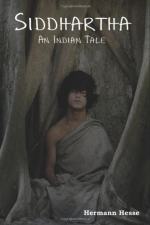Silently, Siddhartha exposed himself to burning rays of the sun directly above, glowing with pain, glowing with thirst, and stood there, until he neither felt any pain nor thirst any more. Silently, he stood there in the rainy season, from his hair the water was dripping over freezing shoulders, over freezing hips and legs, and the penitent stood there, until he could not feel the cold in his shoulders and legs any more, until they were silent, until they were quiet. Silently, he cowered in the thorny bushes, blood dripped from the burning skin, from festering wounds dripped pus, and Siddhartha stayed rigidly, stayed motionless, until no blood flowed any more, until nothing stung any more, until nothing burned any more.
Siddhartha sat upright and learned to breathe sparingly, learned to get along with only few breathes, learned to stop breathing. He learned, beginning with the breath, to calm the beat of his heart, leaned to reduce the beats of his heart, until they were only a few and almost none.
Instructed by the oldest if the Samanas, Siddhartha practised self-denial, practised meditation, according to a new Samana rules. A heron flew over the bamboo forest—and Siddhartha accepted the heron into his soul, flew over forest and mountains, was a heron, ate fish, felt the pangs of a heron’s hunger, spoke the heron’s croak, died a heron’s death. A dead jackal was lying on the sandy bank, and Siddhartha’s soul slipped inside the body, was the dead jackal, lay on the banks, got bloated, stank, decayed, was dismembered by hyaenas, was skinned by vultures, turned into a skeleton, turned to dust, was blown across the fields. And Siddhartha’s soul returned, had died, had decayed, was scattered as dust, had tasted the gloomy intoxication of the cycle, awaited in new thirst like a hunter in the gap, where he could escape from the cycle, where the end of the causes, where an eternity without suffering began. He killed his senses, he killed his memory, he slipped out of his self into thousands of other forms, was an animal, was carrion, was stone, was wood, was water, and awoke every time to find his old self again, sun shone or moon, was his self again, turned round in the cycle, felt thirst, overcame the thirst, felt new thirst.
Siddhartha learned a lot when he was with the Samanas, many ways leading away from the self he learned to go. He went the way of self-denial by means of pain, through voluntarily suffering and overcoming pain, hunger, thirst, tiredness. He went the way of self-denial by means of meditation, through imagining the mind to be void of all conceptions. These and other ways he learned to go, a thousand times he left his self, for hours and days he remained in the non-self. But though the ways led away from the self, their end nevertheless always led back to the self. Though Siddhartha fled from the self a thousand times, stayed in nothingness, stayed in the animal, in the stone, the return was inevitable, inescapable was the hour, when he found himself back in the sunshine or in the moonlight, in the shade or in the rain, and was once again his self and Siddhartha, and again felt the agony of the cycle which had been forced upon him.




